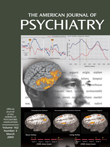Aripiprazole and Depression in Schizoaffective Disorder
Mr. A, a 54-year-old married white man, was diagnosed with schizoaffective disorder, bipolar type. He experienced an onset of manic symptoms and psychosis beginning at age 12. His psychotic symptoms persisted during periods of euthymia. His later depressive episodes became more chronic and severe, with significant suicidal ideation. He had had multiple hospitalizations for depression. His most recent manic episode had also required hospitalization. He had suffered from chronic depression that was unresponsive to numerous antidepressants, including adequate trials with venlafaxine, paroxetine, lamotrigine, and sertraline. He had additionally been treated with a series of atypical antipsychotics, including risperidone, ziprasidone, and quetiapine. When we assumed his care, he was receiving 160 mg/day of ziprasidone, 150 mg/day of sertraline, 300 mg/day of lamotrigine, and 2 mg/day of risperidone. Although his psychotic symptoms were controlled, he was depressed and functioning poorly.Aripiprazole, 15 mg/day, was initiated and later increased to 30 mg/day. Risperidone and ziprasidone were tapered and discontinued. Mr. A experienced a progressive resolution of his depression. Within 2 weeks of beginning treatment with aripiprazole, he reported improved mood, interest, energy, and concentration. Suicidal and homicidal ideation, hopelessness, and auditory hallucinations abated, and he developed a positive affect. His Global Assessment of Functioning Scale score went from 50 to a present score of 75. His Clinical Global Improvement ratings went from “no change” to “very much improved.” Mr. A stated that he was happy and better able to tolerate stress and indicated that his “life [had] improved substantially.” Lamotrigine and sertraline were also tapered and discontinued. He was currently taking aripiprazole, 30 mg/day, as monotherapy, with no manic or depressive episodes over the last 12 months.
References
Information & Authors
Information
Published In
History
Authors
Metrics & Citations
Metrics
Citations
Export Citations
If you have the appropriate software installed, you can download article citation data to the citation manager of your choice. Simply select your manager software from the list below and click Download.
For more information or tips please see 'Downloading to a citation manager' in the Help menu.
There are no citations for this item
View Options
View options
PDF/ePub
View PDF/ePubGet Access
Login options
Already a subscriber? Access your subscription through your login credentials or your institution for full access to this article.
Personal login Institutional Login Open Athens loginNot a subscriber?
PsychiatryOnline subscription options offer access to the DSM-5-TR® library, books, journals, CME, and patient resources. This all-in-one virtual library provides psychiatrists and mental health professionals with key resources for diagnosis, treatment, research, and professional development.
Need more help? PsychiatryOnline Customer Service may be reached by emailing [email protected] or by calling 800-368-5777 (in the U.S.) or 703-907-7322 (outside the U.S.).

